Intermittent Fasting: What Is It And How Does It Work?
Track your mealtimes and stick to your fasting phase to make the most of this practice.
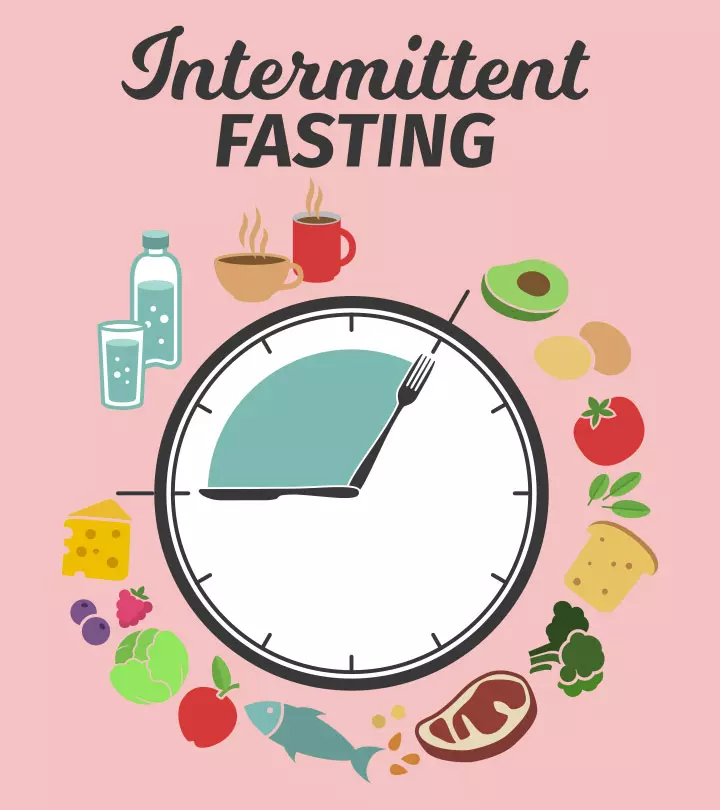
Image: Shutterstock
Intermittent fasting has many health benefits (1). It is said to be a healthy way to lose weight. Research shows that it can help protect brain function as well (2), (3). If you are new to it, check out our beginner’s guide to intermittent fasting. It talks about how to practice intermittent fasting correctly, what to eat, how it benefits you, and any side effects of not eating for a prolonged period of time. Scroll down!
 At A Glance: Intermittent Fasting
At A Glance: Intermittent Fasting- Principle: An eating pattern that alternates between periods of eating and fasting that results in stored calories being used up for energy.
- Purpose: To lower blood glucose levels, build muscles, improve insulin sensitivity, and aid in weight loss.
- Who It Is For: People with type-2 diabetes or neurodegenerative issues.
- Duration: Long-term
- Who Should Avoid: People who are underweight, have a (a history of) eating disorders, have hypoglycemia, pregnant or breastfeeding individuals, and children.
- Cons: May lead to fatigue, eating disorders, sleep cycle disturbances, muscle loss, infertility in women, and nutritional deficiencies.
In This Article
Intermittent Fasting 101 – A Beginner’s Guide
- What is Intermittent Fasting?
- How To Do
- Ways To Do
- What To Eat
- IF Diet Chart
- Does It Work For Weight Loss?
- Can You Try With Keto Diet?
- Can You Build Muscle On IF?
- Other Health Benefits
- When To Avoid?
- Side Effects
- Expert’s Answers
What Is Intermittent Fasting?

Intermittent fasting is a process of eating and fasting alternately. This type of eating helps restrict calorie consumption and/or use the stored calories in the form of usable energy. This has shown to have various health benefits. How to do intermittent fasting? Find the quick, comprehensive guide below.
How To Do Intermittent Fasting For Beginners
To begin intermittent fasting, follow these 5 rules:
#1 – There is no calorie restriction in intermittent fasting. But you can easily consume fewer calories by breaking down your food intake to 6 meals per day. Skip one of the meals, and you will reduce your calorie intake.
#2 – Test the waters first. Fast for 6 hours and then gradually increase your fasting duration. Fast once or twice a week before trying to fast intermittently every alternate day or every day.
#3 – Try to schedule your fasting phase in a way that you get 7 hours of sleep during that time. Go to bed 3-4 hours after a big meal, get your sleep, and you are already into 11 hours of fast! Wait it out for 1-4 hours (depending on the type of intermittent fasting you do), and you have successfully fasted intermittently.
#4 – Keep yourself hydrated by drinking enough water.
#5 – Talk to your doctor or a registered dietitian. If they allow you to do intermittent fasting, move ahead!
There are various ways you can do intermittent fasting. Listed below are the types of intermittent fasting. Choose the one that suits you.
6 Ways To Do Intermittent Fasting
- 16/8 Intermittent Fasting –It requires you to fast for 16 hours and space out your meals within a short window of 8 hours. This type of intermittent fasting is also known as the 8-hour Diet, 16/8 diet, or Time-Restricted Feeding. For instance, if you have your breakfast at 9 in the morning, your last meal of the day will have to be at 5 in the evening. You will then have to fast until the next morning. Meal timing and prep are important here.
- 5:2 Intermittent Fasting – 5:2 fasting involves consuming food without any restrictions for five days in the week and being on a calorie-restricted diet (500-Calorie Diet) for two non-consecutive days (4).
- Alternate Day Fasting– This fasting pattern consists of alternating feasting and fasting days. You can consume anything on the feasting days. But on the fast days, you can consume only about 20% of your body’s total energy needs (2). If you consume 2000 calories on the fasting day, you can only consume 400 calories on the fasting day.
- 24 Hours Fast – Go on a 24-hour fast for 1 or 2 days a week. Choose the day according to your schedule and convenience. Do this only if your doctor approves it.
- Warrior Diet – Fasting during the day and feasting during the night is a lifestyle that the warriors followed. Consume protein-rich foods and a heavy dinner at night. You must also include exercising in your routine. This balance of fasting and exercising will keep you active and fit without an inch of extra body fat. Read more about the warrior diet plan.
- Skip A Meal –Skip any of the major meals – breakfast, lunch, or dinner. That way, you can reduce the number of calories consumed and also remained in a fasted state.
Note:
Skip a meal only if you had a heavy meal and are not very hungry.
Intermittent Fasting Diet – What To Eat
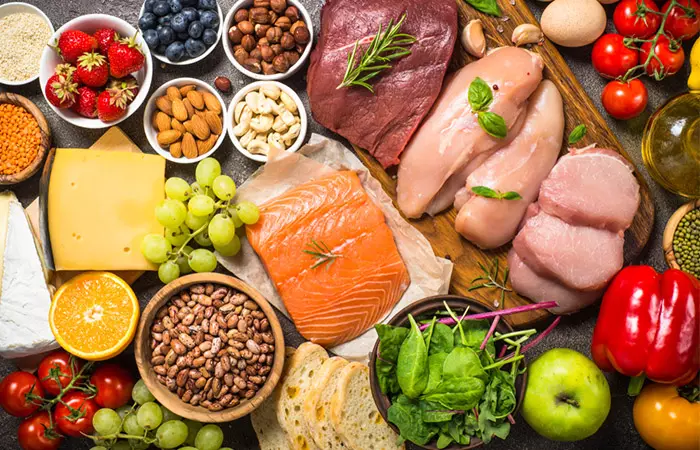
During Feasting Hours Or Days – Eat foods that satiate your hunger and keep your taste buds alive. You may take the liberty to eat anything.But if you are going on intermittent fasting for health reasons or to lose weight, avoid foods that nullify your effort. Also, avoid foods that you are allergic to.
During Fasting Hours Or Days – Consume a total of 500 calories per day (for women) or 600 calories per day (for men). Foods rich in dietary fiber will keep you full. Drink water, coconut water, and freshly pressed juices. Consume raw/grilled vegetable salad with lime juice, a pinch of Himalayan pink salt, a tablespoon of olive oil, and a dash of smoked paprika.
Sip on detox water made with watermelon, kiwi, cucumber, and a pinch of salt. It will keep your body from missing out on essential micronutrientsi Vitamins and minerals that the body needs in micrograms for its functioning, growth, and development. and electrolytesi Essential minerals in the body's tissues, urine, and other fluids that carry an electric charge and balance the body's water levels. . Mint leaves tend to increase hunger, so avoid using them.
A blogger shared that she tried intermittent fasting for a week and the only thing she had to change in her diet was to have black coffee instead of milk coffee in the morning. She states in one of her blog posts, “Unsurprisingly, the fasting bit wasn’t challenging since I usually skip breakfast (i).” The blogger adds, “I lost 2 kgs! I have been trying to lose weight for a while now and this was a pleasant surprise since I didn’t change A LOT in my diet.”
Here’s a sample intermittent fasting diet schedule if you choose the 16/8 intermittent fasting method:
Sample Intermittent Fasting Diet Chart
You can eat anything you want in the 8-hour window. This diet chart is a generic diet chart, and it is not specifically meant for weight loss or any other health issue(s).
| Day 1 | Day 2 | Day 3 | Day 4 | Day 5 | Day 6 | Day 7 | |
|---|---|---|---|---|---|---|---|
| Breakfast (8:30 a.m.) | Eggs or oatmeal | Smoothie | Acai bowl | Egg and bacon or pancakes | Multigrain flakes with milk | Protein smoothie | Waffles or pancakes |
| Lunch (12:00 p.m.) | Chicken or mushroom salad | Dahl soup + grilled veggies + 1 piece dark chocolate | Pasta/sandwich | Noodles | Grilled fish and salad | Shakshuka | Smoked fish fillet + herbed rice + 1 cup chocolate ice cream |
| Snack (3:30 p.m.) | Any snack of your choice | Any snack of your choice | Any snack of your choice | Any snack of your choice | Any snack of your choice | Any snack of your choice | Any snack of your choice |
| Dinner (6:30 p.m.) | Mushroom risotto | Crab cakes and herbed rice + 1 cup warm milk before bed | Soup + 1 piece of dark chocolate | Chicken tikka masala or mushroom and peas masala and flatbread | Tofu and rice noodles + 1 cup vanilla ice cream | Grilled chicken, hummus, and pita bread | Spaghetti and meatballs + 1 cup warm milk before bed |
| Fast | Fast | Fast | Fast | Fast | Fast | Fast | Fast |
Clearly, intermittent fasting doesn’t keep you from eating what you want in a window of time. But what if you want to lose weight? Will intermittent fasting work? Find out next.
Does Intermittent Fasting Work For Weight Loss?
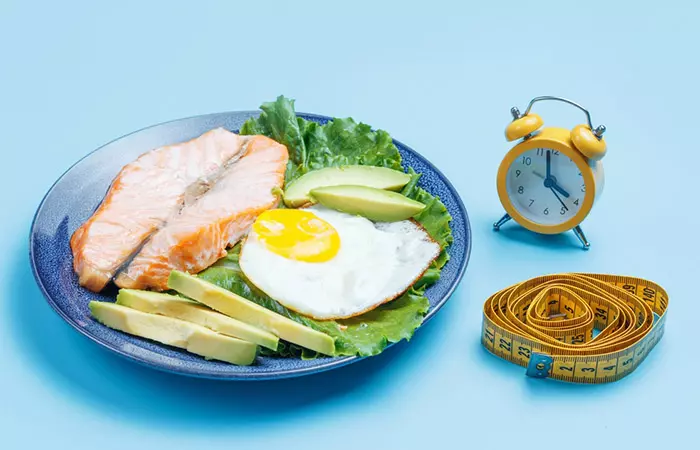
Yes, intermittent fasting works for weight loss. Here’s how:
- Lowers blood glucose and improves insulin sensitivity – Studies show that intermittent fasting helps lower blood glucose levels and reduces body weight. It does so by lowering insulin levels and improving insulin sensitivityi Sensitivity of your body cells to insulin, the high levels of which mean that the cells effectively use the glucose in the blood. (5), (6), (7).
- Uses fat stores as an energy source – When you are in a fasted state (not had food for at least 6-8 hours), it becomes easier for your body to burn fat, irrespective of what you have eaten. Instead of drawing fuel from glucose, your body starts converting glycogeni The primary source of fuel for the body's cells, which also is a storehouse for the carbohydrates that you consume. and/or protein to glucose. When the protein reserve is fully utilized, fat is used as a source of fuel.
- Increases number of good gut bacteria – Intermittent fasting also increases the number and variety of gut microbes, which aid proper digestion (8). It also helps lower inflammation and inflammation-induced weight gain (9).
- Fasting prompts growth hormone-induced fat loss – Scientists have found that fasting induces the secretion of growth hormone (10). This, in turn, aids fat loss (11).
A study of 547 individuals tracked the time of meals and sleep for at least one day. Over 6.3 years, the number of meals per day was positively correlated with weight change. The average number of weight measures in EHR among the 547 individuals in the study was 23.7 overall, 21.3 before participation, and 3.4 in the six months following participation.
 Did You Know?
Did You Know?When it comes to weight loss, the keto diet is quite the trend these days. Can you be on keto and intermittent fasting together? Let’s find out.
Can You Do Intermittent Fasting On A Keto Diet?
Yes, you may continue being on the keto diet while intermittent fasting. But here’s the catch. Intermittent fasting does not restrict carb consumption. Fasting for long might make you want to consume foods rich in carbohydrates, which may throw you off ketosisi A state your body enters when it doesn’t have enough carbs to burn for energy and instead burns fat. . But if you can load up on fat and protein and limit your carb consumption according to the keto diet guidelines, you can successfully be in ketosis.
What if you want to build muscle and not just lose fat? Can you build muscles while following intermittent fasting? Find your answer below.
Can You Build Muscle On Intermittent Fasting?
Yes, you can build muscle while on intermittent fasting. Intermittent fasting will help shed the extra pounds. You must include strength training in your routine to build muscle. You may choose to hit the gym in the morning in the fasted state or in the evening before dinner. There are many benefits of lifting weights or strength training that you can reap whether you want to build muscle or not.
Other than weight loss, intermittent fasting has other health benefits. Here’s a list.
Other Health Benefits of Intermittent Fasting

- Intermittent Fasting Is Easier Than “Dieting”
Fasting intermittently is easier than going on a restrictive diet. Intermittent fasting breaks the monotony of consuming the same foods in the same quantities and makes dieting fun and interesting.
- Aids Weight Loss
Intermittent fasting is one of the most effective ways to lose weight and maintain weight loss (12). The alternating low-calorie and high-calorie food intake keep your cells functioning well, which, in turn, boosts metabolism.
- Protects Heart Health
Intermittent fasting is a great way to shed fat and, consequently, help improve your heart health. American scientists found that by practicing alternate-day fasting, obese patients were able to lose weight and reduce the risk of coronary artery disease (CAD) (13).
- Improves Insulin Sensitivity
Intermittent fasting may also help improve insulin sensitivity (14). When your body becomes insulin sensitive, your glucose metabolism improves, and you stop feeling hungry all the time.
- Promote Cellular Repair And Autophagy
Intermittent fasting may also improve cellular repair and autophagy. Autophagy is your body’s natural process of degrading the dysfunctional components of the cells and recycling them. The upregulation of autophagy may be neuroprotectivei The ability of a substance or ingredient that protects the neural cells from damage, infection, or death. and act as a treatment for Alzheimer’s disease (15).
- Inhibits Cancer Cell Growth
Rat studies showed that intermittent fasting might help reduce the risk of cancer by increasing the antioxidant effect and inhibiting cancer cell growth (16). However, more human studies are needed for further confirmation.
- Protects Brain Function
Intermittent fasting (IF) helps improve cognitive function and protect the brain from an inflammatory response (17). Scientists have found that IF can help ameliorate neurodegenerationi A condition characterized by the dysfunction and death of the cells of the central nervous system. in mice with induced Alzheimer’s disease (18). IF can also help increase the production of brain-derived neurotrophic factor (BDNF), which has been found to protect the brain from degeneration and dysfunction in animal models (19).
- Reduces Inflammation And Blood Pressure
Intermittent fasting may also help reduce inflammation and pro-inflammatory cytokines. Additionally, if you are hypertensive, fasting intermittently may help reduce your blood pressure (20).
- Lowers Bad Cholesterol Levels
Intermittent fasting can help in lowering LDL cholesterol (bad cholesterol) (21). It also reduces triglyceride levels. Triglyceridesi A type of fat found in the blood, and the form the calories that your body does not immediately require are converted to. are fats found in blood, and their elevated levels can lead to cardiovascular problems (22).
Apart from these, there are many other intermittent fasting benefits you may want to learn more about. While there seems to be no reason you shouldn’t fast intermittently, but not everyone should do it and there are specific circumstances under which it should be avoided. Let’s find out in the next section.
When To Avoid Intermittent Fasting

As per the John Hopkins University, kids and adolescents under the age of 18 should avoid intermittent fasting (23). Other than that, you should avoid intermittent fasting in the following cases:
- Avoid intermittent fasting if you are underweight, have an eating disorder, or have been advised against it by your doctor.
- A few studies have shown that women tend to miss their period, and their blood sugar levels go up when they practice intermittent fasting (24), (25), (26). Therefore, avoid intermittent fasting if you are pregnant, breastfeeding, or have fertility issues.
- If you do not sleep well and have chronic stress, do not fast intermittently.
- Avoid intermittent fasting if you have low blood pressure and blood sugar regulation problems.
Note:
Always consult your doctor before practicing intermittent fasting.
Intermittent fasting is not meant for everyone. If you have a history of eating disorders, you should not fast without consulting your doctor first.
Before we come to a close, take a quick look at the side effects of IF.
Side Effects of Intermittent Fasting
- You may feel irritated.
- When practiced long-term, it may lead to an eating disorder.
- It may hinder athletic performance.
- It may cause muscle loss.
- It may cause amenorrheai Unusual absence of menstrual periods, the symptoms of which may include hair loss, excess facial hair, and headaches. and infertility in women.
Key Takeaways
- Intermittent fasting involves eating and fasting alternately to restrict calorie consumption.
- There are many ways to do intermittent fasting, and this method can lower blood sugar, promote gut health, and improve heart health.
- If you balance it with proper nutrition, exercise, and sleep, intermittent fasting can greatly facilitate weight loss and improve health.
Infographic: Top 5 Benefits Of Intermittent Fasting
Intermittent fasting is a popular method where you eat meals within 8 hours and fast for 16 hours. This may aid in weight loss and provide other important health benefits. Check out the following infographic to learn about the top reasons for incorporating this practice into your life.

Illustration: StyleCraze Design Team
Intermittent fasting is a method of alternately eating and fasting. It aids in calorie restriction and/or the utilization of stored calories as useful energy. Intermittent fasting also aids in weight loss. Some people benefit from intermittent fasting, while others do not. However, it is an effective strategy to reduce weight and improve health if you combine it with healthy eating, exercise, and sleep. You can fast on occasion, but not regularly. Consult your doctor before following this method to understand if it will work for you or not.
Frequently Asked Questions
Can intermittent fasting affect my mental health?
Yes, intermittent fasting can positively impact your mental health. Research suggests that doing it consistently can potentially reduce anger, anxiety, and stress (28).
Can I drink lemon water during intermittent fasting?
The intermittent fasting method permits plain lemon water containing solely lemon juice. The beverage does not break your fast as it has nearly no calories. When practicing intermittent fasting, drinking 1 or 2 glasses of lemon water can also aid in fat loss and hunger control.
Can you take vitamins during intermittent fasting?
Regular vitamin pills and capsules are safe to take while fasting because they are unlikely to alter insulin levels. However, vitamins sold as liquids, chewable tablets, or gummies are often flavored with sweeteners. They can provoke an insulin spike, so take them within your meal period if you use them.
Can you lose 1kg a week fasting intermittently?
Yes, it is possible to lose 1 kg of weight by fasting intermittently given that you properly maintain the calorie deficit. How much weight you lose is dependent on various factors like diet, the body’s metabolism, physical activity, etc.
What not to eat while intermittent fasting?
Although intermittent fasting does not pose strict restrictions on what you eat, it is a good idea to avoid junk or processed foods, trans fat, large meals, and alcohol.
Do celebrities do intermittent fasting?
Celebrities like Jennifer Aniston, Kourtney Kardashian, and High Jackman have openly spoken about intermittent fasting and how it has helped them maintain a healthy weight.
Can we eat curd during intermittent fasting?
During the fasting period, it is not okay to consume any food or drink with calories as it defeats the purpose. Curd has protein and probiotics but it has calories hence it cannot be consumed during intermittent fasting.
Does intermittent fasting work without exercise?
Yes, intermittent fasting works even without exercise but combining intermittent fasting and a healthy exercise routine will give you faster and more visible results.
Illustration: Intermittent Fasting: What Is It And How Does It Work?
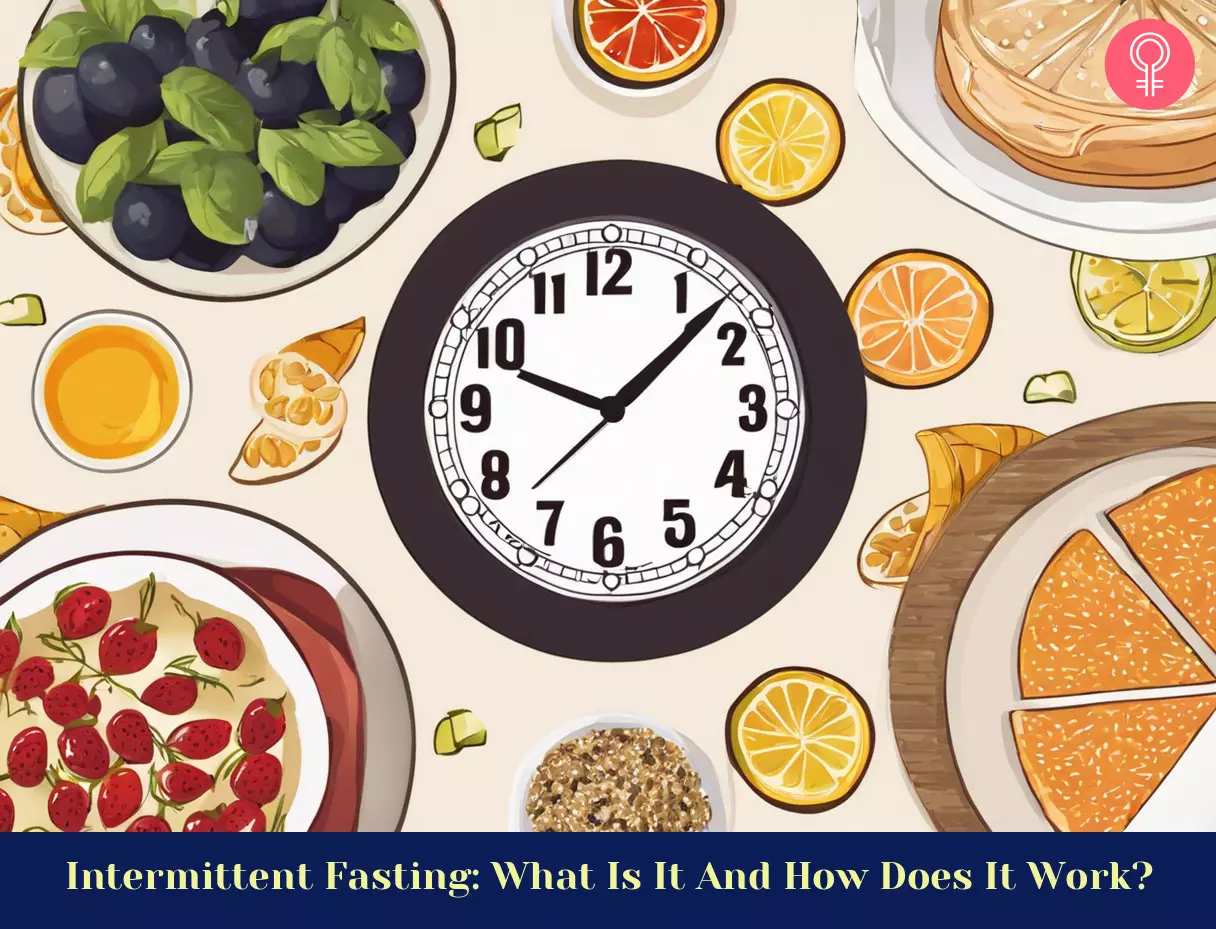
Image: Stable Diffusion/StyleCraze Design Team
Intermittent fasting can help you lose weight even on a busy schedule. The video below focuses on the benefits of this fasting cycle and how it can help you reach your weight loss goals. Check it out!
Personal Experience: Source
StyleCraze's articles are interwoven with authentic personal narratives that provide depth and resonance to our content. Below are the sources of the personal accounts referenced in this article.
i. Me| One week of intermittent fastinghttps://thenirvanatales.com/2020/12/21/me-one-week-of-intermittent-fasting/
References
Articles on StyleCraze are backed by verified information from peer-reviewed and academic research papers, reputed organizations, research institutions, and medical associations to ensure accuracy and relevance. Read our editorial policy to learn more.
- Intermittent Fasting in Cardiovascular Disorders—An Overview, Nutrients, US National Library of Medicine, National Institutes of Health.
https://www.ncbi.nlm.nih.gov/pmc/articles/PMC6471315/ - Intermittent Fasting: The Choice for a Healthier Lifestyle, Curēus, US National Library of Medicine, National Institutes of Health.
https://www.ncbi.nlm.nih.gov/pmc/articles/PMC6128599/ - The Effectiveness of Intermittent Fasting to Reduce Body Mass Index and Glucose Metabolism: A Systematic Review and Meta-Analysis, Journal of Clinical Medicine, US National Library of Medicine, National Institutes of Health.
https://www.ncbi.nlm.nih.gov/pubmed/31601019 - INTERMITTENT FASTING AND HUMAN METABOLIC HEALTH, Journal of the Academy of Nutrition and Dietetics, US National Library of Medicine, National Institutes of Health.
https://www.ncbi.nlm.nih.gov/pmc/articles/PMC4516560/ - Comparison of glycemic improvement between intermittent calorie restriction and continuous calorie restriction in diabetic mice, Nutrition &Metabolism, US National Library of Medicine, National Institutes of Health.
https://www.ncbi.nlm.nih.gov/pmc/articles/PMC6714240/ - The Effectiveness of Intermittent Fasting to Reduce Body Mass Index and Glucose Metabolism: A Systematic Review and Meta-Analysis, Journal of Clinical Medicine, US National Library of Medicine, National Institutes of Health.
https://www.ncbi.nlm.nih.gov/pubmed/31601019 - Clinical Management of Intermittent Fasting in Patients with Diabetes Mellitus, Nutrients, US National Library of Medicine, National Institutes of Health.
https://www.ncbi.nlm.nih.gov/pmc/articles/PMC6521152/ - Restructuring of the Gut Microbiome by Intermittent Fasting Prevents Retinopathy and Prolongs Survival in db/db Mice, Diabetes, US National Library of Medicine, National Institutes of Health.
https://www.ncbi.nlm.nih.gov/pubmed/29712667 - Intermittent fasting during Ramadan attenuates proinflammatory cytokines and immune cells in healthy subjects, Nutrition Research, US National Library of Medicine, National Institutes of Health.
https://www.ncbi.nlm.nih.gov/pubmed/23244540 - Intermittent fasting during Ramadan attenuates proinflammatory cytokines and immune cells in healthy subjects, Nutrition Research, US National Library of Medicine, National Institutes of Health.
https://www.ncbi.nlm.nih.gov/pubmed/23244540 - Fasting enhances growth hormone secretion and amplifies the complex rhythms of growth hormone secretion in man, The Journal of Clinical Investigation, US National Library of Medicine, National Institutes of Health.
https://www.ncbi.nlm.nih.gov/pmc/articles/PMC329619/ - Obesity, growth hormone and weight loss, Molecular and Cellular Endocrinology, US National Library of Medicine, National Institutes of Health.
https://www.ncbi.nlm.nih.gov/pubmed/19723558 - Fasting for weight loss: an effective strategy or latest dieting trend? International Journal of Obesity, US National Library of Medicine, National Institutes of Health.
https://www.ncbi.nlm.nih.gov/pubmed/25540982 - Short-term modified alternate-day fasting: a novel dietary strategy for weight loss and cardioprotection in obese adults, The American Journal of Clinical Nutrition, US National Library of Medicine, National Institutes of Health.
https://www.ncbi.nlm.nih.gov/pubmed/19793855 - Early Time-Restricted Feeding Improves Insulin Sensitivity, Blood Pressure, and Oxidative Stress Even without Weight Loss in Men with Prediabetes, Cell Metabolism, US National Library of Medicine, National Institutes of Health.
https://www.ncbi.nlm.nih.gov/pubmed/29754952 - Short-term fasting induces profound neuronal autophagy, Autophagy, US National Library of Medicine, National Institutes of Health.
https://www.ncbi.nlm.nih.gov/pmc/articles/PMC3106288/ - Effects of short-term dietary restriction on survival of mammary ascites tumor-bearing rats, Cancer Investigation, US National Library of Medicine, National Institutes of Health. https://www.ncbi.nlm.nih.gov/pubmed/3245934
- Intermittent fasting could ameliorate cognitive function against distress by regulation of inflammatory response pathway, Journal of Advanced Research, US National Library of Medicine, National Institutes of Health.
https://www.ncbi.nlm.nih.gov/pmc/articles/PMC5608558/ - Intermittent fasting and caloric restriction ameliorate age-related behavioral deficits in the triple-transgenic mouse model of Alzheimer’s disease, Neurobiology of Disease, US National Library of Medicine, National Institutes of Health.
https://www.ncbi.nlm.nih.gov/pubmed/17306982 - Energy intake, meal frequency, and health: a neurobiological perspective, Annual Review of Nutrition, US National Library of Medicine, National Institutes of Health.
https://www.ncbi.nlm.nih.gov/pubmed/16011467 - Role of Intermittent Fasting on Improving Health and Reducing Diseases, International Journal of Health Sciences, US National Library of Medicine, National Institutes of Health.
https://www.ncbi.nlm.nih.gov/pmc/articles/PMC4257368/ - Impact of intermittent fasting on the lipid profile: Assessment associated with diet and weight loss, Clinical Nutrition ESPEN, US National Library of Medicine, National Institutes of Health.
https://www.ncbi.nlm.nih.gov/pubmed/29576352 - Intermittent Fasting: What is it, and how does it work? | Johns Hopkins Medicine
https://www.hopkinsmedicine.org/health/wellness-and-prevention/intermittent-fasting-what-is-it-and-how-does-it-work - Triglyceride and cardiovascular risk: A critical appraisal, Indian Journal of Endocrinology and Metabolism, US National Library of Medicine, National Institutes of Health.
https://www.ncbi.nlm.nih.gov/pmc/articles/PMC4911828/ - Glucose tolerance and skeletal muscle gene expression in response to alternate day fasting, Obesity Research, US National Library of Medicine, National Institutes of Health.
https://www.ncbi.nlm.nih.gov/pubmed/15833943 - Sex-dependent metabolic, neuroendocrine, and cognitive responses to dietary energy restriction and excess, Endocrinology, US National Library of Medicine, National Institutes of Health.
https://www.ncbi.nlm.nih.gov/pubmed/17569758 - Gonadal transcriptome alterations in response to dietary energy intake: sensing the reproductive environment, PloS One, US National Library of Medicine, National Institutes of Health.
https://www.ncbi.nlm.nih.gov/pubmed/19127293 - The effects of intermittent fasting on brain and cognitive function, US National Library of Medicine, National Institutes of Health.
https://pmc.ncbi.nlm.nih.gov/articles/PMC8470960/
Read full bio of Merlin Annie Raj
Read full bio of Ravi Teja Tadimalla
Read full bio of Sindhu Koganti






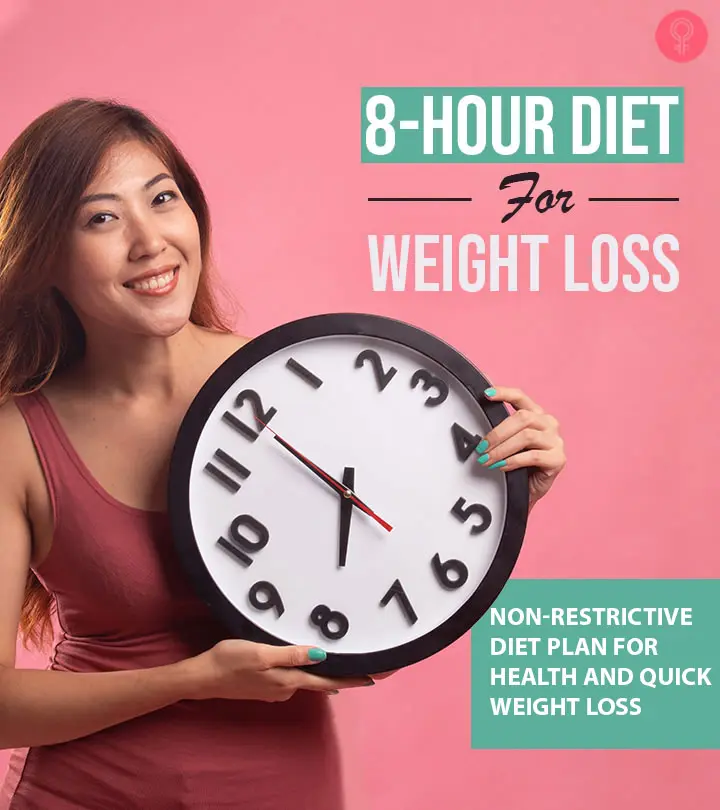










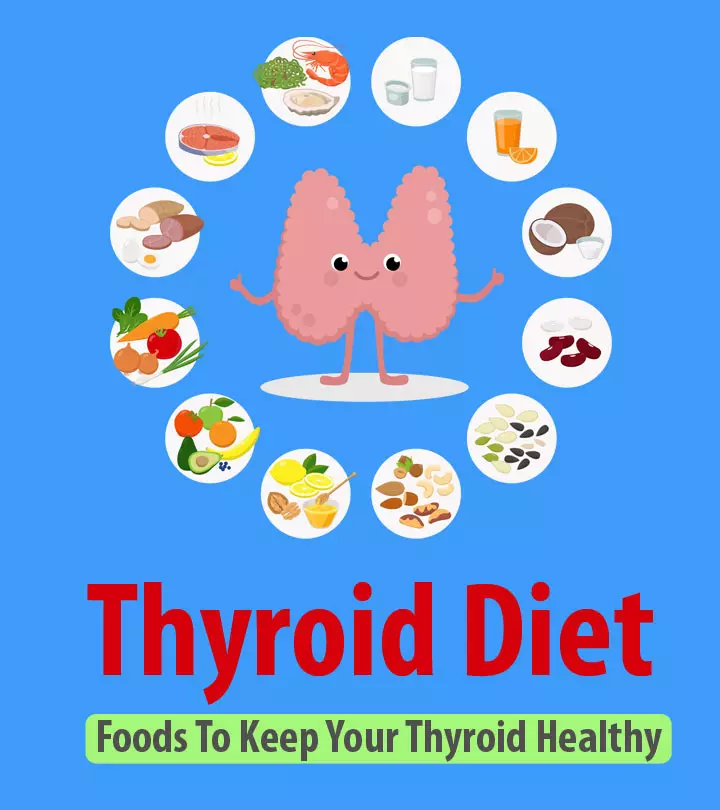
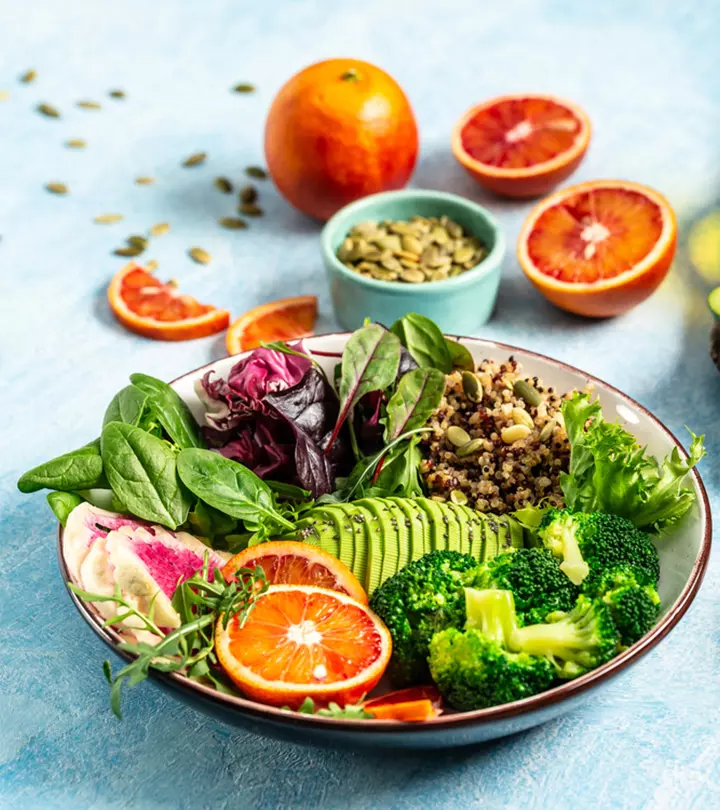

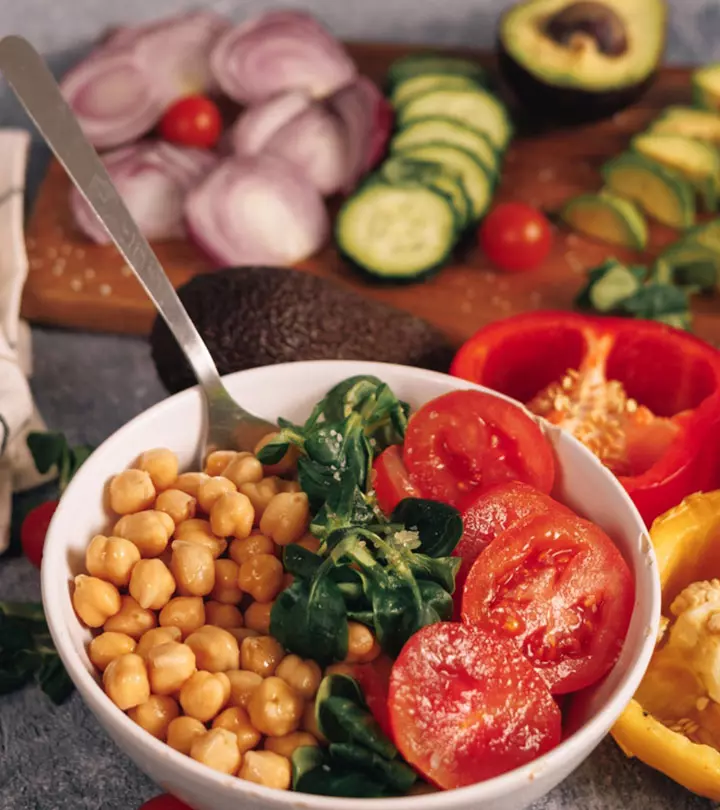

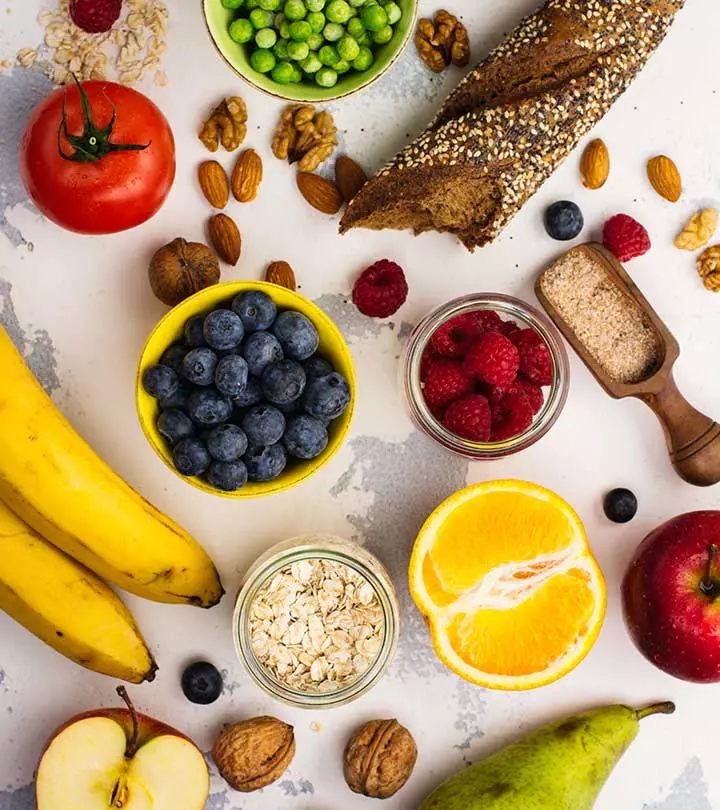



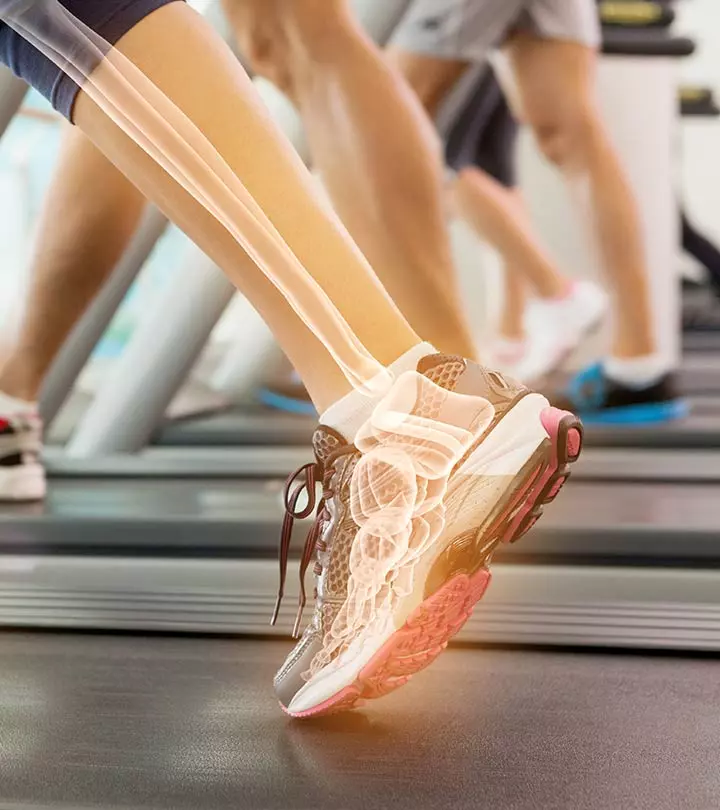
Community Experiences
Join the conversation and become a part of our empowering community! Share your stories, experiences, and insights to connect with other beauty, lifestyle, and health enthusiasts.